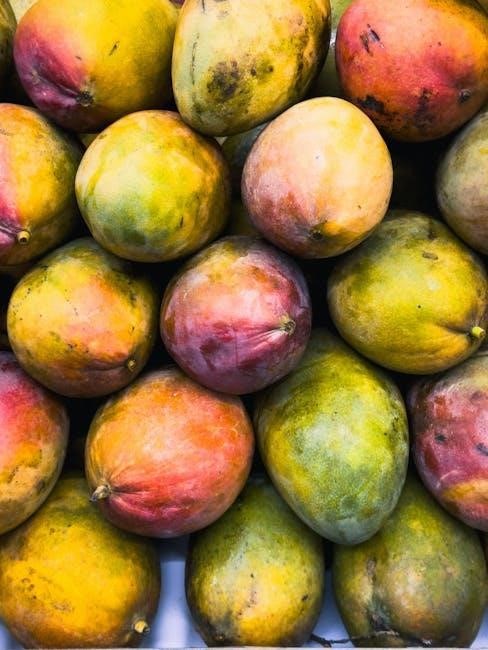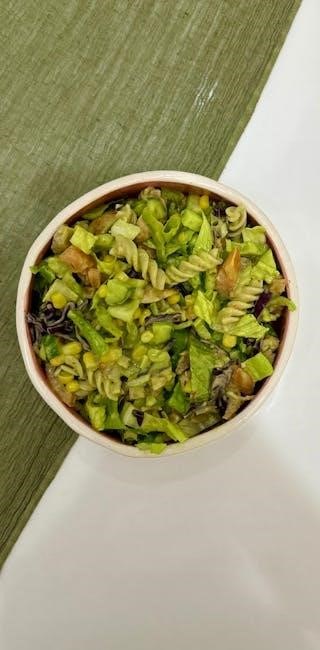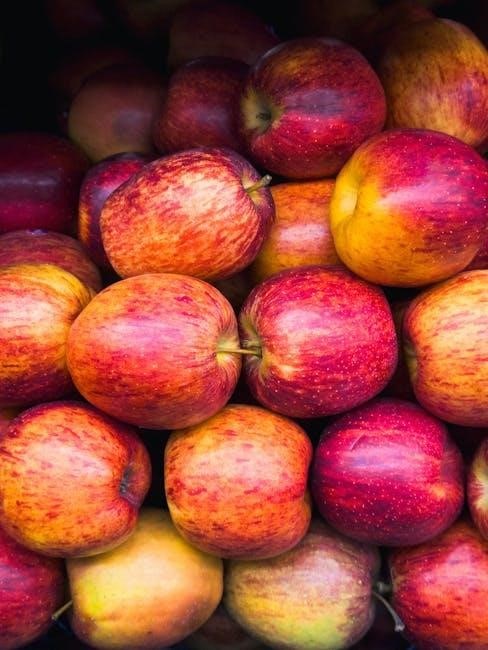Overview of Gastric Ulcer Diet
An ulcer diet aims to alleviate symptoms and prevent further irritation. While there’s no strict “ulcer diet,” focusing on foods that reduce acid production, inflammation, and bacterial growth is key; This involves choosing gentle foods and avoiding those that exacerbate ulcer symptoms, promoting healing and overall well-being.

Understanding Gastric Ulcers
Gastric ulcers are open sores in the stomach lining, often caused by H. pylori infection or long-term use of NSAIDs. These disrupt the stomach’s protective layer, allowing acid to cause damage. While stress and diet were once blamed, current understanding emphasizes bacterial infection and medication as primary causes.
Causes and Symptoms
Gastric ulcers, or stomach ulcers, arise primarily from two major factors: infection with Helicobacter pylori (H. pylori) bacteria and prolonged use of nonsteroidal anti-inflammatory drugs (NSAIDs). H. pylori weakens the stomach’s protective lining, making it vulnerable to acid. NSAIDs, commonly used for pain relief, can also erode this lining over time. Damage to the mucosal layer, which shields the stomach from gastric acid, increases the risk of ulcer development.
Many individuals with stomach ulcers remain asymptomatic. However, when symptoms do manifest, they can include a gnawing or burning pain in the stomach, often occurring between meals or during the night. Other symptoms may involve nausea, bloating, diarrhea, and in severe cases, bleeding. Untreated ulcers can lead to complications, underscoring the importance of recognizing these potential warning signs. Early detection and proper management are crucial for preventing further health issues.
Understanding both the causes and symptoms is the first step towards effective treatment and dietary adjustments to manage gastric ulcers.

Dietary Recommendations for Gastric Ulcers
Managing gastric ulcers involves dietary adjustments to soothe the stomach lining and promote healing. Focusing on easily digestible foods, avoiding irritants, and incorporating ulcer-friendly options can significantly reduce symptoms and aid in the recovery process. A balanced approach is essential.
Foods to Include
A gastric ulcer-friendly diet should prioritize foods that are gentle on the stomach and promote healing. Incorporate fiber-rich options like oatmeal, apples, and pears, which can help reduce stomach acid levels and protect the stomach lining. Non-citrus vegetables such as carrots, broccoli, kale, and spinach are nutrient-dense and low in acid, making them ideal choices. Lean protein sources like chicken, turkey, and fish are essential for tissue repair and overall health.
Consider fermented foods like miso, sauerkraut, and kimchi, which contain probiotics that can aid in ulcer treatment by promoting a healthy gut microbiome. Blueberries, cherries, bell peppers, and leafy greens are also beneficial due to their antioxidant and anti-inflammatory properties.
Decaffeinated green tea and olive oil can further support healing. Cook fruits and vegetables without added sugar or fat, and choose low-acid fruits like melons and pumpkins. These dietary choices can help soothe the stomach, reduce inflammation, and promote the healing of gastric ulcers.
Foods to Avoid
Managing gastric ulcers effectively involves limiting foods that can irritate the stomach lining and exacerbate symptoms. It’s crucial to avoid gastric irritants such as large amounts of alcohol, carbonated beverages, caffeine, chocolate, chili, and peppers, as these can increase acid secretion and worsen ulcers. Spicy foods, while not problematic for everyone, can be an irritant for some individuals with ulcers, so moderation is key.
Acidic foods like tomatoes and tomato products, as well as citrus fruits such as lemons, should be limited due to their potential to increase stomach acidity. High-fat, salty, and sugary processed foods can also hinder healing and should be avoided.
Additionally, consider minimizing coffee and soda intake, as these can stimulate acid production. By avoiding these problematic foods, individuals with gastric ulcers can reduce symptoms like stomach pain, bloating, heartburn, and indigestion, promoting a more comfortable healing process.
The Role of Fiber in Ulcer Management
Fiber plays a significant role in managing gastric ulcers and promoting overall digestive health. Research suggests that a diet rich in fiber can lower the risk of developing ulcers. Foods high in fiber can coat the stomach lining, reducing damage from gastric acid and harmful substances. Harvard researchers found a 45% lower ulcer risk in those with the highest fiber intake.
Including fruits, vegetables, and whole grains in your diet provides essential fiber that aids in ulcer management. These foods contribute to a balanced diet, promoting healing and reducing irritation; A high-fiber diet also supports healthy digestion and helps regulate stomach acid production, further preventing ulcer aggravation.
Incorporating fiber-rich foods is a crucial step in managing ulcers and maintaining a healthy gastrointestinal tract. This dietary approach not only reduces ulcer risk but also alleviates symptoms and improves overall well-being.

Probiotics and Gastric Health
Probiotics may aid ulcer treatment by improving gastric health. They introduce beneficial bacteria, potentially combating H. pylori. Including probiotics supports gut health and could contribute to ulcer healing. Consult healthcare professionals for personalized recommendations on probiotic use.
Fermented Foods
Fermented foods may play a beneficial role in gastric health due to their probiotic content. These foods, including yogurt, kefir, sauerkraut, kimchi, and miso, contain live microorganisms that can positively influence the gut microbiome. The probiotics in fermented foods can aid in digestion, reduce inflammation, and potentially inhibit the growth of harmful bacteria like H. pylori, a common cause of stomach ulcers.
Clinical studies suggest that incorporating fermented foods into the diet may improve ulcer treatment outcomes. These foods can help restore balance to the gut flora, strengthening the stomach’s protective lining and promoting healing. However, it’s essential to choose fermented foods carefully, opting for those with low acidity and avoiding those with high salt or sugar content, which can irritate the stomach lining.
Furthermore, individual tolerance to fermented foods may vary, so it’s advisable to introduce them gradually into the diet and monitor any adverse reactions. Consulting with a healthcare professional or registered dietitian can help determine the appropriate types and amounts of fermented foods to include in a gastric ulcer diet.
Importance of Lean Protein
Lean protein sources play a vital role in managing gastric ulcers. Protein is essential for tissue repair and regeneration, crucial for healing the damaged stomach lining. Lean protein options, such as chicken, turkey, fish, tofu, and legumes, provide the necessary amino acids without excessive fat, which can exacerbate ulcer symptoms.
These protein sources are easily digestible and less likely to stimulate acid production compared to fatty meats. Including lean protein in your diet helps promote healing and supports overall digestive health. Aim to incorporate protein into each meal to maintain stable blood sugar levels and reduce the risk of overeating, which can further irritate the stomach.
Preparing lean protein through baking, grilling, or steaming is preferable to frying, as it minimizes the addition of unhealthy fats. Combining lean protein with fiber-rich foods, like vegetables and whole grains, can enhance satiety and provide a balanced nutritional profile, contributing to effective ulcer management and long-term well-being. Always consult with a healthcare provider for personalized dietary advice.

Lifestyle Modifications
Managing gastric ulcers effectively extends beyond dietary changes and necessitates comprehensive lifestyle modifications. Stress management is paramount, as stress can exacerbate ulcer symptoms. Techniques such as yoga, meditation, deep breathing exercises, and regular physical activity can help reduce stress levels and promote relaxation. Adequate sleep is also crucial for overall health and ulcer healing.
Smoking cessation is essential, as smoking impairs healing and increases the risk of ulcer development. Limiting alcohol consumption is equally important, as alcohol can irritate the stomach lining and delay recovery. Maintaining a healthy weight can also alleviate pressure on the stomach and reduce the likelihood of acid reflux.
Furthermore, it’s advisable to eat smaller, more frequent meals to avoid overfilling the stomach and triggering acid production. Avoiding lying down immediately after eating can also prevent acid reflux. Consulting with a healthcare professional for personalized guidance on lifestyle modifications is crucial for effective ulcer management and long-term well-being. These changes, combined with dietary adjustments, contribute to a holistic approach to healing.
